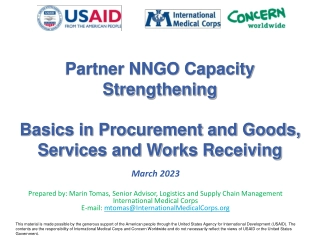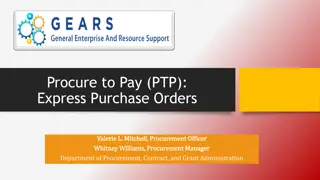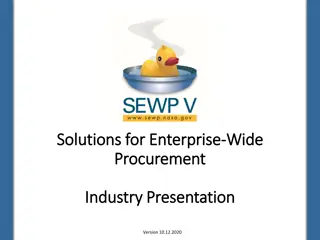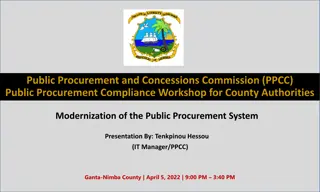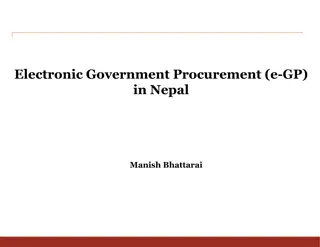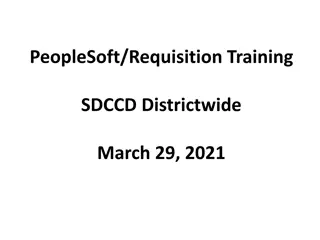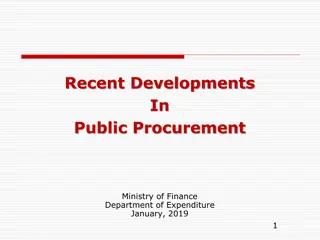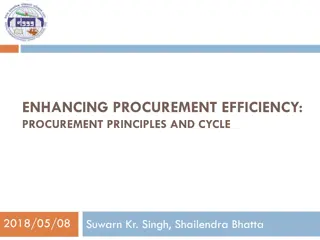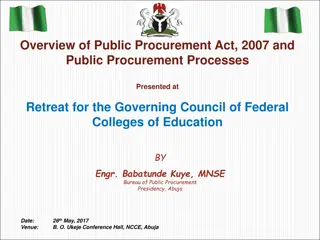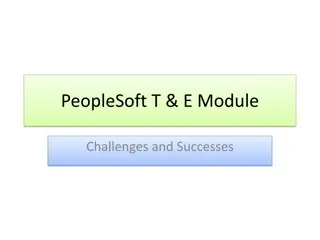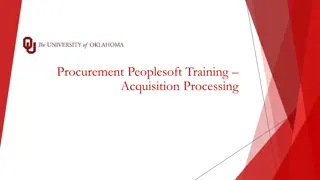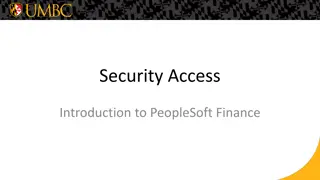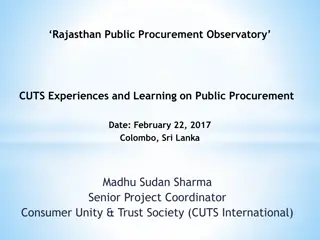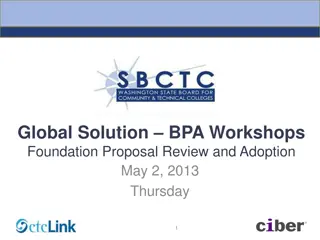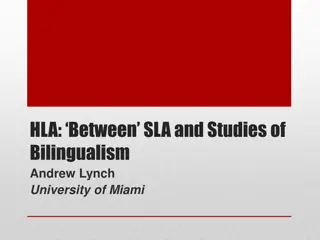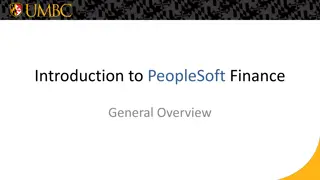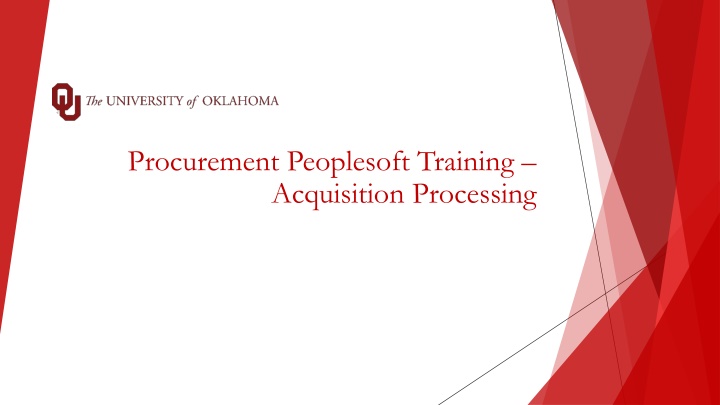
Procurement Peoplesoft Training Acquisition Processing
In the world of procurement, understanding key terms like requisition, purchase order, and contract negotiation is vital. Cooperative procurement and sole sourcing also play important roles in effective acquisition processes. Dive into this comprehensive guide for insights on PeopleSoft training and acquisition processing.
Download Presentation

Please find below an Image/Link to download the presentation.
The content on the website is provided AS IS for your information and personal use only. It may not be sold, licensed, or shared on other websites without obtaining consent from the author. If you encounter any issues during the download, it is possible that the publisher has removed the file from their server.
You are allowed to download the files provided on this website for personal or commercial use, subject to the condition that they are used lawfully. All files are the property of their respective owners.
The content on the website is provided AS IS for your information and personal use only. It may not be sold, licensed, or shared on other websites without obtaining consent from the author.
E N D
Presentation Transcript
Procurement Peoplesoft Training Acquisition Processing
Table of Contents Topic Definitions Procurement Website Informal Competition Policy Acquisition Flowchart Peoplesoft Roles Helpful Information Slide 3 7 8 9 10 11
Definitions Requisition - A requisition is a formal request for obtaining a product or service. Purchase Order - A purchase order, or PO, is an official document issued by Procurement committing to pay a seller for specific products or services to be delivered in the future. Quote - A quote is a document that lists the prices proposed by a seller for specific products or services offered to OU. Contract A contract is a written agreement between parties creating mutual obligations enforceable by law. Contract Negotiation - Contract negotiation is a set of steps taken to agree upon a set of terms and conditions that are legally binding. As such, contract negotiation is a crucial element of contract lifecycle management. While negotiating an agreement, both parties try to seek favorable outcomes without adversely affecting their own position. Supplier A supplier is a person or organization that provides something needed such as a product or service.
Cooperative Procurement - Cooperative Procurement is when two or more entities obtain a contract together to leverage the benefits of volume purchases, delivery, and supply chain advantages, best practices, and the reduction of administrative time and expenses. OU participates in various Cooperative organizations to fulfill formal competition requirements and to obtain the benefits previously described. Piggyback (Piggyback Cooperatives) is a term used to describe the process of one entity using the contract of another entity using the same pricing and terms. Economies of scale - Economies of scale occur when a business benefits from the size of its operation. As a company gets bigger, it can negotiate or produce more efficient pricing, expertise, and timelines. Request for Proposal - A request for proposal (RFP) is a document businesses release that announces an upcoming project they would like to implement. The RFP lists details about the incoming project and asks suppliers to submit proposals, which list their strategy and desired budget to complete the project. RFP processes are classified as Formal Competition. Request for Quote - A request for quote (RFQ), also known as an invitation to bid (ITB), is a document businesses release to solicit price quotes for the chance to sell products. RFQ processes are classified as informal competition.
Request for Information A request for information (RFI) is a document businesses release to solicit information from suppliers to develop RFQs and RFPs. RFIs do not result in a contract. Sole Source - A sole source is defined as the only supplier that can provide the specific products or services needed. The sole source has either established a monopoly or is the only supplier from which buyers can obtain what they need. In some instances, the sole source is the choice because it is the only vendor available at a specific time that can handle what a business owner requires, or it is the only vendor that carries that product. For example, a vendor who carries automobile parts that are no longer manufactured is considered a sole source because any company that needs that part must sign a contract with that specific vendor. Emergency Declaration - Emergency declarations can activate funds, personnel, and material to aid in the response to an emergency. Traditionally, declarations have been used against immediate and unforeseen threats such as tornadoes, fires, ice storms causing extended power outages and pandemics. Processing Timeframes Non-formal competition requisitions on average, requisitions take 30 days to process from the time of entry through PO issuance. Formal competition requisitions RFQs and RFPs must be available for public consideration on the website for a minimum of 30 days.
Due Diligence - Due diligence is the research conducted prior to engaging in an acquisition transaction. Procurement conducts due diligence on each requisition, including but not limited to, comparing the available procurement methods to attain the goods and/or services, conducting market research, analyzing costs, ensuring the process and resulting contract conforms to Regents and Procurement policies and State laws and best practices, and ensuring that all required documents retained in the contract file. Definite Quantity Purchases Definite quantity purchases are used when the exact number of items and exact prices are known at the time of purchase. Example: 2 widgets at $5.00. Indefinite Quantity Purchases Indefinite quantity purchases are used when purchasing services, that can have established prices such as price per hour, but that it is unknown how many units will be used in a given month. For example, a consultant is hired at $50 an hour who will work variable hours during the month.
Website The Procurement website is located at www.ou.edu/purchasing. Policy documents, forms, frequently asked questions and this PowerPoint is located on the website. As the website is updated frequently, screenshots are not included in this PowerPoint, but we will now go through a brief tour of the website. Policy Fair and Reasonable Sole Source Resources
Informal Competition Policy Acquisition Limits define the process Procurement uses to process purchases. The Informal Competition Worksheet is required to be submitted for purchases between $25,001 and $150,000.
Peoplesoft Roles Requesters Enter requisitions and change orders into Peoplesoft Receive invoices against Purchase Orders Cancel requisitions Cannot approve requisitions Approver Review requisition chart field spread and documents Approve requisitions Cannot enter requisitions
Helpful Information
Policy and Helpful Information Regents Policy: Administrative Policies and Procedures > Home (ouhsc.edu) Policy (ou.edu) Helpful Information Purchasing (ou.edu) Training (ouhsc.edu) To request access to Peoplesoft and to request access to another Requestor s requisitions and POs, please fill out the form at: https://financialservices.ouhsc.edu/Forms
Additional Questions and contact Procurement Questions: AskPurchasing@ouhsc.edu Purchasing Website: ou.edu/Purchasing Purchasing Staff Directory: ou.edu/Purchasing/Staff_Directory
Cooperative Agreements Links to some of the cooperative agreements are below. The Procurement website will maintain an updated list. Office of Management Enterprise Services (OMES): https://www.ok.gov/dcs/solicit/app/contractSearch.php Omnia Partners: https://www.omniapartners.com E&I Cooperative Services: https://www.eandi.org Buyboard Purchasing Cooperative: https://www.buyboard.com Sourcewell: https://www.sourcewell-mn.gov/

